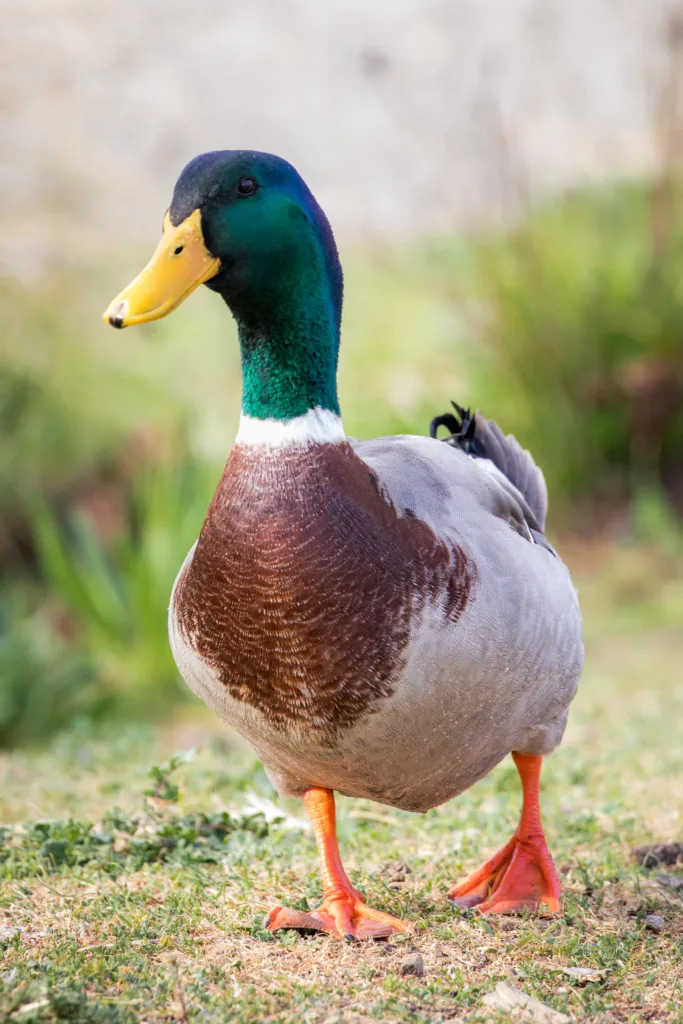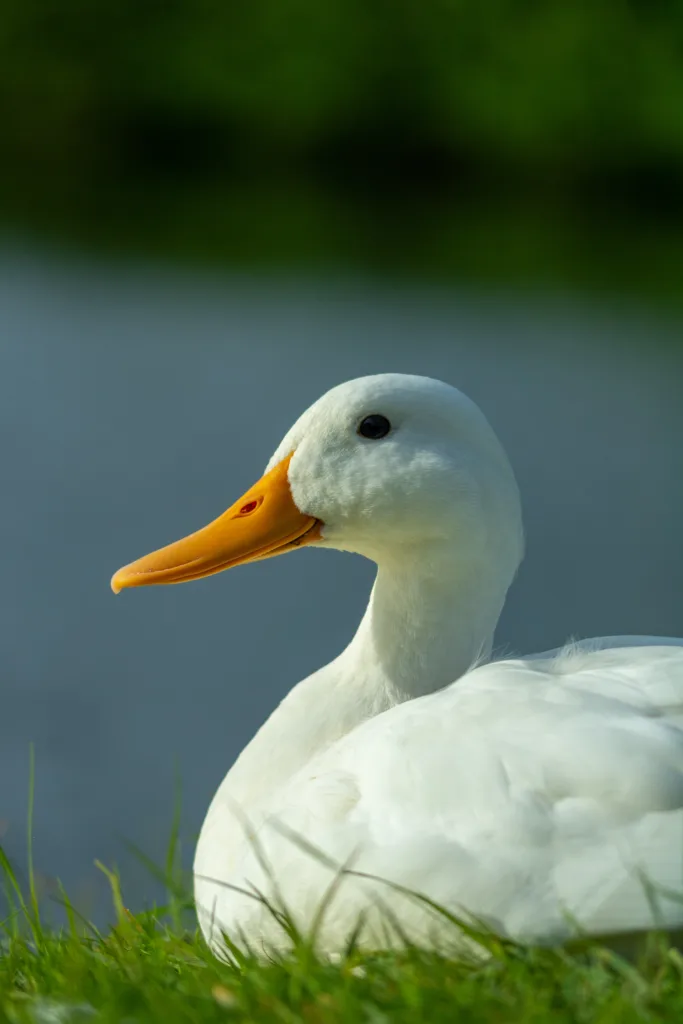If you’ve ever watched a duck waddling around a pond, you may have wondered if they have ears. After all, you can’t see any fleshy flaps sticking out of their head like you would on a dog or cat. So, do ducks have ears? The answer is yes, they do, but not in the same way as humans or other mammals.
Ducks’ ears are located behind their eyes and are covered by small, stiff feathers. These feathers help protect the ear canal from water and other debris that could enter wile the duck is swimming or feeding. While the lack of visible pinnae may make it seem like ducks don’t have ears, they are there, just not as noticeable as other animals.
In terms of hearing ability, ducks are actually quite sensitive to sound. Their hearing range extends from 66 Hz to 7.6 kHz, with a best sensitivity of 12.5 dB at 2 kHz. To put this in perspective, humans’ hearing range is typically between 20 Hz and 20 kHz, with a best sensitivity around 2-4 kHz. This means that ducks are better at detecting sounds within a specific frequency range than humans are.
However, it’s important to note that ducks’ hearing thresholds are not lower than humans’. In fact, at no frequency, including the lowest tested, were the ducks’ thresholds lower than those of humans. This means that while ducks may be better at detecting certain sounds, they are not necessarily better at hearing overall.
So, while ducks may not have visible ears like other animals, they do have a sophisticated auditory system that allows them to hear and communicate with each other. The next time you’re watching ducks at the park or in a pond, take a moment to appreciate their unique hearing abilities and the hidden ears that make it all possible.
Do Ducks Have Ears?
Yes, ducks do have ears. However, unlike humans and many other animals, the avian ear lacks the external fleshy flaps called pinnae that stick out on either side of the head. Instead, ducks have small openings located just behind their eyes that are covered by small, stiff feathers. These openings lead to the inner ear, which is responsible for processing sound and maintaining a sense of balance. So, while ducks may not have visible ears like we do, they do possess an internal auditory system that allows them to hear and navigate their surroundings.

Source: chesapeakebay.net
The Hearing Ability of Ducks
Ducks actually have quite an impressive range of hearing abilities. At a sound pressure level of 60 dB (re 20 μN/m2), their range of hearing extends across 6.85 octaves, spanning from 66 Hz to 7.6 kHz. Their most sensitive hearing is at a frequency of 2 kHz, with a best sensitivity of 12.5 dB. Despite their impressive hearing range and sensitivity, it’s worth noting that ducks’ hearing thresholds are not lower than those of humans, even at the lowest frequencies tested. Overall, it’s safe to say that ducks have a remarkable ability to perceive and interpret a wide variety of sounds in their environment.
The Number of Ears Ducks Have
Ducks actually have two ears, just like humans and most other animals. However, their ears are not as visible as ours. Unlike us, ducks’ ears are not on the outer side of their head, but rather small holes located behind and below their eyes. These holes are not easily noticeable, which is why we often assume that ducks do not have ears. But rest assured, they do indeed have ears and use them for hearing, just like we do.
Can Ducks Hear Humans?
Yes, ducks can hear humans. However, the way they hear is different from humans. Ducks have an auditory system that is specifically designed to pick up on sounds in their environment. They have two small openings on the sides of their head, called ear canals, which lead to their middle ear. Unlike humans, ducks do not have an outer ear or earlobes.
Ducks can hear a range of sounds that are inaudible to humans, including high-frequency sounds. They can also differentiate between sounds and recognize the source of the sound. For example, they can distinguish between the sound of a predator approaching and the sound of a friendly duck.
It is important to note that while ducks can hear humans, they may not always respond to human speech or commands. Ducks communicate with each other using a variety of vocalizations and body language, which may not be understood by humans. Additionally, ducks may be wary of humans and may choose to avoid them, especially if they perceive them as a threat.
Do Ducks Have Testicles?
Yes, ducks do have testicles. The testicles are the male reproductive organs responsible for the production of sperm. In ducks, the testicles are located internally in the abdominal cavity, near the kidneys. They are oval-shaped and vary in size depending on the age of the duck. During the breeding season, the testicles of male ducks becme more prominent and increase in size. The sperm produced in the testicles is then transported through the vas deferens to the cloaca, where it can be transferred to the female during mating. So, the testicles are a crucial part of the reproductive system of male ducks.

Do Ducks Possess Intelligence?
Yes, ducks do have brains. Like all birds, ducks have a complex nervous system which includes a well-developed brain. Their brains are relatively small compared to oter animals, but they are highly specialized for tasks such as navigation, communication, and social behavior. The duck’s brain is divided into different regions that control different functions, such as the cerebellum for motor coordination and the forebrain for learning and memory. Additionally, research has shown that ducks are capable of complex problem-solving and have excellent visual and spatial cognition. Overall, despite their small size, the duck’s brain is a remarkable and essential organ for their survival and adaptation in their environment.
The Perception of Humans by Ducks
Ducks have a remarkable vision that enables them to see humans in a distinct way. They have a high number of color-receptive cones in their retina that allows them to form crisp images and spot the human form. This means that ducks are capable of distinguishing different colors, shapes, and patterns, which helps them recognize humans from oter objects in their environment. However, this trade-off is poor night vision, which means that ducks may have difficulty seeing humans in low light conditions.
Another unique feature of the duck’s vision is the presence of a structure called the pecten, which is a high concentration of blood vessels in the retina. This structure provides superior sensitivity to motion, which means that ducks can detect even the slightest movements of humans. This ability is particularly useful when humans are trying to approach or hunt ducks.
In summary, ducks see humans through a combination of color vision, shape and pattern recognition, and motion sensitivity provided by the pecten. While ducks may have difficulty seeing humans in low light conditions, their superior sensitivity to motion allows them to detect even the slightest movements of humans.
Can Ducks Comprehend Human Language?
Yes, ducks are intelligent creatures that can understand basic commands and communicate with humans. They have the ability to recognize familiar faces, respond to their names, and even follow simple instructions. Additionally, ducks have been observed to exhibit empathy and emotional responses to various situations. With proper training and socialization, ducks can develop a strong bond with their human caretakers and be able to understand and respond to them. However, it is important to note that each duck has its own personality and level of intelligence, and some may be more receptive to human interaction than others.
Can Ducks See in the Dark?
Yes, ducks can see in the dark due to the high density of rods in their eyes, which allow them to see in low-light conditions. This gives them an advantage over humans who have fewer rods in their eyes and struggle to see in the dark. Additionally, ducks have a wider range of the light spectrum they can see, including ultraviolet light, which is invisible to humans. Overall, the combination of their high rod density and wider range of light perception make ducks well adapted to seeing in various lighting conditions, including the dark.

What Colors Are Invisible to Ducks?
Ducks have a wide range of color vision and are capable of seeing evry color that humans can see. However, there are no specific colors that ducks cannot see. It is important to note that ducks have a higher sensitivity to ultraviolet (UV) light than humans, which means that they can perceive colors in the UV spectrum that we cannot see. This sensitivity allows ducks to better navigate their environment, find food, and identify potential predators. In summary, ducks have a very comprehensive color vision and are capable of seeing a wide range of colors, including those in the UV spectrum.
Facts About Ducks
Sure, here are 3 facts about ducks:
1. Ducks are aquatic birds that are commonly found near water bodies such as rivers, ponds, and lakes. They have webbed feet which make them excellent swimmers. The webbing helps them to paddle efficiently and to dive under the water to catch prey.
2. Ducks are known for their egg-laying abilities. The female ducks are able to lay up to 12 eggs at a time. The incubation period for duck eggs is around 28 days, ater which they hatch into cute ducklings.
3. There are over 120 different species of ducks. Each species has unique features such as body size, color, and behavior. For instance, the Mandarin duck is known for its bright and colorful plumage, while the Muscovy duck has a distinctive red face and warty protuberances on its head. Ducks are also important to humans for their meat, eggs, feathers, and down.
The Anatomy of a Duck: What Are Duck Ears Called?
Duck ears are not referred to by a specific name, but the openings are located slightly behind and below the eyes, and are covered with soft feathers called auriculars. These feathers offer protection and help to muffle the sound of the wind when the birds are in flight. While waterfowl lack external ear appendages, they do have a well-developed middle ear that allows them to hear well both in and out of water. Overall, the ear structure of ducks is a critical adaptation for their survival and success in their aquatic environments.
Do Ducks Recognize Human Faces?
Recent studies have shown that ducks, like many other birds, have the ability to remember human faces. In fact, ducks have a highly developed visual system that allows them to recognize and remember specific patterns and shapes, including human faces. This ability is not limited to just their owners or caretakers, but they can also recognize faces of people they have only seen a few times.
Furthermore, research has revealed that ducks can differentiate between familiar and unfamiliar faces, indicating that they have the ability to remember and distinguish between individuals. It is also suggested that ducks may associate certain faces with positive or negative experiences, which could influence their behavior towards tose individuals.
Overall, it is safe to say that ducks have a remarkable ability to remember human faces and can distinguish between familiar and unfamiliar individuals. This skill is likely to be important for their survival, as it allows them to identify potential threats and form strong social bonds with those who provide them with food and protection.
Can Ducks Recognize Human Faces?
Yes, ducks and other waterfowl possess an acute sense of vision that allows them to detect very slight movements, including facial expressions. This means that ducks can see your face and may react to it. It is recommended to wear something on your face and hands to minimize movement and avoid startling the ducks. This is particularly important when approaching ducks for observation or photography purposes. By minimizing movement and wearing appropriate gear, we can help to reduce the disturbance and stress on these sensitive animals.
Do Ducks Pay Attention to Humans?
Ducks, like many animals, have the ability to observe their surroundings and may look in the direction of a person or object that catches their attention. However, there is no evidence to suggest that ducks watch humans in a way that is threatening or intrusive. The idea of ducks watching people is a fictional concept that was created as satire by cartoonist Gary Larson in a 1988 comic. While anatidaephobia, the fear of a duck watching you, is not a real phobia, it is important to note that some people may have a fear of ducks, kown as anatophobia. In general, ducks are harmless animals that are unlikely to cause any harm or pose a threat to humans.

Conclusion
In conclusion, ducks do have ears, but they are not visible to us as they do not have external pinnae like humans or other mammals. Instead, they have small holes located just behind and below thir eyes that are covered by small, stiff feathers. Despite this difference, ducks have a remarkable hearing range that extends from 66 Hz to 7.6 kHz at a sound pressure level of 60 dB. Their best sensitivity is at 2 kHz with a threshold that is not lower than that of humans. Therefore, it is safe to say that ducks do have ears, and they are equipped with a unique auditory system that allows them to hear and respond to different sounds in their environment.
